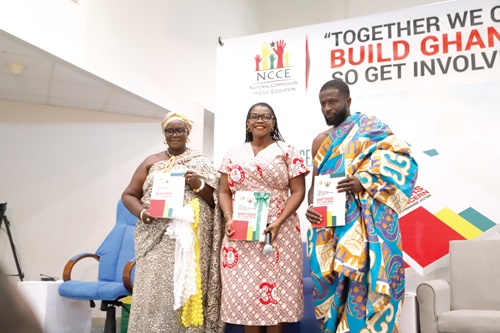
Education, top priority for voters — NCCE Report
A Study conducted by the National Commission for Civic Education (NCCE) has revealed that the electorate are prioritising education, roads and infrastructure, employment, health and the economy as the top five issues political parties should address towards the December 7 elections this year.
About 18.3 per cent of the respondents mentioned challenges in the free senior high school policy, as well as inadequate educational infrastructure as some of the issues the next government needed to tackle.
The second issue of concern was unemployment, where 15.7 per cent of respondents suggested the creation of more employment opportunities and the building of factories.
On health, 12.5 per cent of the respondents called for the construction of more infrastructure in the sector.
Ten per cent also stressed the need to build more roads, while 7.2 per cent of the respondents cited the economy as a major challenge.
The study dubbed “Matters of Concern (MoC) to the Ghanaian Voter”, was conducted in August 2024, with a total of 9,324 respondents from across the 16 regions and constituencies in the country.
The report was launched by the Chairperson of the NCCE, Kathleen Addy, in Accra yesterday.
Others
The respondents also shared their views on how Members of Parliament should address issues of concern to them using their share of the Common Fund.
Data was collected between August 12 and 28, 2024, concurrently in all the 276 constituencies.
Other matters of concern were agriculture - 6.9 per cent; social services (sanitation, KVIPs, water) - 5.5 per cent; women and children’s needs - 3.4 per cent; corruption - 3.0 per cent, and youth development - 2.9 per cent.
The rest were security - 2.8 per cent; energy - 2.3 per cent; needs of persons with disability - 1.8 per cent; social intervention policies - 1.7 per cent; taxes and tariffs - 1.6 per cent; housing - 1.5 per cent; rule of law, patriotism -1.3 per cent; information and communications technology - 0.6 per cent; environmental and climate change - 0.5 per cent, and sports - 0.5 percent.
Highlights of the report that were presented by the Director of Research, Monitoring and Evaluation of the NCCE, Dr Henrietta Asante-Sarpong, also indicated that voters’ confidence in the electoral system had declined from 62.2 per cent in 2016, to 42.1 per cent in 2024.
Responsibilities
Ms Asante-Sarpong said that the organisation was working to promote and sustain democracy, while inculcating in the citizenry the awareness of their rights and obligations through civic education.
She said the survey and report was an election year flagship programme of the commission.
“We have faithfully produced this report every election year and, essentially, it represents the accurate voice of the people.
“In this report, we clearly see exactly what is important to citizens and what we expect from those we elect to lead, as well as other duty-bearers.
“It speaks to the hopes and dreams of the people and paints a vivid picture of the Ghana we all aspire to live in.
“Every leader, elected or not, must take keen interest in this report because it tells you what the people expect and it is the basis for NCCE constituency town hall meetings which is a platform for parliamentary candidates to interact with citizens in their community,” the director added.
Review
In a review of the report, the Dean of the University of Ghana Business School, Prof. Justice Bawole, congratulated the commission, especially the research team “because I can see very great improvement from 2016 to 2020, and now 2024”.
A governance and democracy expert, Dr John Osae-Kwapong, also lauded the NCCE for the work it had been doing since the 2004 elections.
